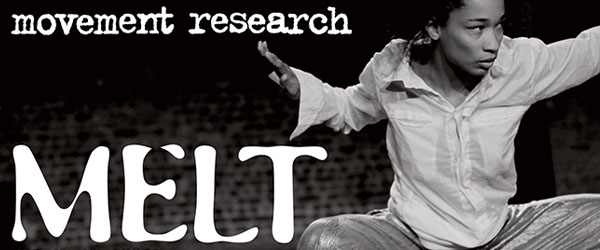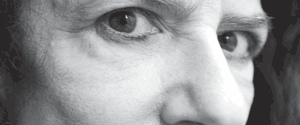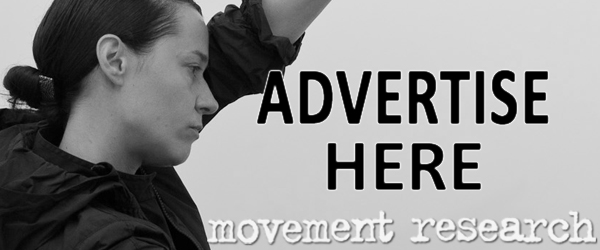Critical Correspondence
- Comments Off on Michelle Boulé and Tarek Halaby in conversation with Abby Crain
- Conversations
- 10.15.09
Michelle Boulé and Tarek Halaby in conversation with Abby Crain
Last Meadow
Download this interview as PDF
Abby Crain: Did you guys improvise a lot? Or not so much?
Michelle Boulé: Yes. The James Dean stuff came into the process on maybe the second week, but definitely not the first week.
Tarek Halaby: Yeah, not right away. Miguel didn’t want to build anything. He wanted to just explore. Like we, we did a lot of stuff with misinterpretation. Having a leader and misinterpreting the leader through improvisation. And then we may have just had open scores.
Abby: You guys seemed to me more like you were shape shifting than dancing or acting. This quality that I saw is it something that is in you? I feel like your characters in Last Meadow, you guys were… well I wrote about it so I’m just going to read it.
“In watching you all, during this piece, you peel yourselves apart, turn yourselves inside out and change into other beings with almost a complete lack of ego. You let us see you, but you don’t show us anything. You seem almost translucent and luminous.”
It’s a quality that I’ve seen in both of you working through the years. When Miguel talks about this piece he says, “There’s no longer an attempt on his part to do something that is authentic or real.” Like he had gotten tired of that and I feel like that ties so much into this ability to just become something else. I’m so intrigued by the quality. What did you guys talked about in rehearsal? What you think about? Or was it just like breathing to you and you don’t even notice it!
Tarek: We weren’t busy with being authentic because we were, specifically, I was, watching the female characters from the two James Dean films. The style of acting was from a time period where they [women] were kind of exaggerated and larger than life their film acting. Immediately, it wasn’t about us as individuals and what we could bring to it because so much of it was trying to take on what these different characters were and how to embody that.
A realness or authenticity comes in how you deal with that kind of material; how you take it on, how you embody it. It’s not only about the text. It’s about your presence on the stage. It’s about, how does that character move throughout the space or would that character dance when we are doing this movement material? Dance wise.
The fact that I was doing a female character was also a further step away from myself. But I think that’s also what was so fun and engaging or exciting about it for me. It’s obvious that I am not a woman and in this performance I even sport a beard.It’s not like I’m trying to be. I’m not trying to act or convince people that I’m this thing. I’m just it.
Abby: Right. Because you are busy being these other characters, it just automatically, on a basic level, distances the Self from the process.
Michelle: There’s so much in terms of action. The way that we dissected the material or, my process in learning it was writing down every single gesture, eye movement or a wink or something. And I’m reminded of taking Lisa Nelson’s workshop where she was talking mostly about the eyes, where she talked about how no gesture, no movement that we do is incidental or random.
Looking at James Dean and sort of digesting every single thing he did was such a nice way to apply this practice of observation of nothing being incidental. There’s kind of a reason why he looks that way.
I feel like there was something so consuming about taking on those characters, or looking at material not just in terms of physical movement where I feel like there is, in the past for me, there has been a lot of space to just ride on something. In this performance I was like, “Oh I am consumed by this material in some way.” So that was really different.
The gender thing too, I remember that in that first rehearsal period we had, being kind of huge for me. Maybe it was also particular to where I was and what I was experiencing at that time… but I thought, “Oh my God. What would it feel like to have a dick?” What is that posture? Tarek is this woman and I am approaching, I am totally moving, making my moves onto this woman and at the time I was like, “Oh my God. How? (Michelle makes an euw sound). You know like, that was huge in the beginning, watching ourselves on video. That huge discrepancy between what I think I am putting across and what it actually reads as. I felt like we really worked on that a lot from the beginning.
Tarek: Yeah.
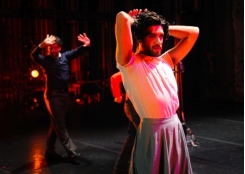
Photo: Ian Douglas, Thumbnail photo: Ian Douglas
Michelle: Miguel would direct us in certain ways, like just being sexy ‘because he is so sexy in this particular way. And like being sexy, but being a man. I mean there’s that brief little interlude where I get to do the Marilyn Monroe poses. And that is woman, but it’s Marilyn Monroe too. It’s a very specific way of being sexy. It’s a similar thing, different gender. Like, look at me. Look at me. Look at me.
Abby: Thanks. Wow. That is really good information. It is amazing that such complex layering of detail makes for such a clear performing presence.
In watching this piece I was reminded of the fact that a lot of important people, especially to our generation, passed away this year: Merce, Farah Fawcett, Michael Jackson, Tom Brokaw. Your grandmother too Michelle, right?
Michelle: Huh?
Abby: Did your grandmother pass away this past year?
Michelle: Yeah, well at the end of last year.
Abby: And with the fact of James Dean dying so young, I really felt the presence of death in the work. I feel it in the way that the presence of death makes things seem larger than life. I am reminded of those moments of transition between worlds that are heightened in their sense of reality. Do you have any thoughts about that?
Michelle: I know that death was very much a part of it because of East of Eden, that movie where James Deans’ character, Cal, his father dies of a stroke. The name of the piece comes from a term for a stroke.
Abby: Oh really?
Michelle: Yeah. I remember before we premiered in New York, I felt like I had this little moment where I just said thank you to him [James Dean] right before I went on stage. I didn’t do that every night. When I cut my wig I had pictures of him that I carried around with me all the time. He’s an archetype. He was who he was, but then there’s this archetype left and I feel like I was more aware of that then I was of this person who died per se. But it’s an interesting question and now that you say it, I instantly think, “Oh how is that going to feed the next performance?”
Abby: Tarek, in this question, I’m thinking of both of you, but I was especially thinking of you. Last Meadow seems so American in it’s content. James Dean and these movies seem paradigmatic of a certain perception of American culture, but this was the first piece you had done in the States in a while, right?
Tarek: Yeah
photo: Miguel Gutierrez by Ian Douglas
Abby: What was that like for you? What is your relationship to being an American or not being an American; and did that impact at all your entry or lack of entry into the process?
Tarek: Entry or lack of entry into the process?
Abby: Yeah, did it feel like, “I can do this because I understand what these people are like? Because I am this or I am not this or I understand what these people are like or, I’m interested this because it’s so strange.” I just wonder how that felt for you.
Tarek: I have to admit, I wasn’t so busy thinking about all of that. I don’t walk around thinking about how American or how un-American I am, you know. Except for the fact that I live overseas and it’s apparent that I am not from where I live. So sometimes I feel very American, but I also feel very Arab at times.
I was really busy with the kind of complexity of taking on the kind of character work that is involved in this process. I didn’t realize the magnitude of these characters or these iconic figures of mother, father, son, James Dean, these love relationships or triangles and how present it is in America. But I also didn’t realize how huge a figure James Dean was either. ‘Cause I had never seen his movies.
The piece was coming together in a way where we were getting it to a place where we were like, “Okay, this is what it is going to be for the premiere” and that’s when Miguel had asked me to sing. At the end of the break I sing My Country, ‘Tis of Thee. I try to sing in a pretty high, as much as I can, in a very light and feminine way of singing it, before we go into the next, the continuation of the piece. Once he asked me to do that, I realized that there was a whole other layer to this performance that wasn’t even registering in my head. Things that Miguel were busy with in his own thought process and creating all of this material, but not something that we were busy discussing so much. I don’t think, were we Michelle?
Michelle: Only in his monologue and maybe somewhere last December when we were working at Abrons before you came back to work with us, we were working with text about America. But we didn’t actively talk about the American thing in rehearsal.
Abby: It’s just so interesting because I feel like, I guess especially because I saw the piece when you guys were working on it during residence in Denton, TX and it was a million degrees and the drive there took me through miles and miles of huge hideous subdivisions and big box stores and the biggest race car track you have ever seen…Kind of epitomizing to me everything that is wrong, in my mind, with America… It’s not a very pretty place. And we are in the midst of this huge, it felt to me, living in Texas, economic, you know… avalanche! It was so poignant to me, that Miguel was working with these films that have this iconography about what the dream is, about what these images of how people are and how they live, but meanwhile everything is just falling apart. No one can pay his or her bills. There is nothing but strip malls and gas stations and there is no place to walk… It’s hideous.
Michelle: There is all this grandeur in those films, especially in Giant. The father son relationship gone wrong in East of Eden and in Rebel [Without a Cause], the misunderstood teenager who wants change and the tragedy in all of those movies. There is something about that that in some ways resonates for me as American. The child. That thing about James Dean that I think people resonate with, he’s the misunderstood person who wants something better; or who doesn’t know how to ask for love; or is like, no one can put a grasp on him, but everyone can love him at the same time. It’s like you can’t touch him, but he so wants to be touched. I’m curious to see how performing this in Europe goes too, because it does feel in some way super American. We did take the costumes from Rebel without a Cause. At one point Miguel wanted me to be dressed as an Evel Knievel with a big American flag sort of Elvis suit on. I’m kind of glad that didn’t happen.
(Chuckles)
But you know that costume that I do wear is the iconic picture that if anyone knows anything about James Dean that’s one of the first photos that comes to mind.
Tarek: The Rebel without a Cause costume?
Michelle: Yeah, and the Americanism of that. He had fan clubs all over the world. So obviously there is something that’s quite American there, but then something that kind of transcends that, in terms of looking at the macro scales of the history of America being colonized, or like parent and child relationships, or micro scales down to the family or even down to an individual; the misunderstandings that we have within ourselves.
Abby: Did either of you have a personal thing that was tested, challenged or molded by the process of working on this piece?
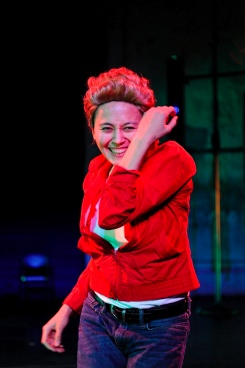
photo: Ian Douglas
Michelle: It was such a comfortable working environment. One of the challenges that I had one time was feeling isolated because I was sort of the isolated character in some ways in the piece, and I think Miguel and Tarek were living together at the time too. So I went through my own personal isolation.
The big challenge for me was letting myself be sexy. I don’t know if it worked….
Abby: I think it worked.
(Laughs from everyone)
Michelle: …and letting myself be sexy and sexy as a man and then like we take, just taking everything off at the end. There is almost a personal catharsis through the journey of the piece. Being stuck in this character and even looking at the pictures of this piece, different from any other piece that I’ve done, I thought, “Oh my God, that’s what it looked like. Like whoa!” ‘Cause the costumes really do a transformation and the things that are happening in our bodies. I mean I’ve seen Tarek do it more, but when I saw myself I was like, “Whoa, that’s what that looked like?” When the barking out the command starts to become this point where I personally feel like I start to explode or reach the limit of the experience of whatever it’s been so far and then we strip it [clothes] all off… empty by the end, nearly empty. I feel like that is the sort of catharsis within the piece. I think we had a lot of fun actually.
Tarek: We did have a lot of fun.
Michelle: It was just fun and we were stupid. There was something about the trust of the three of us, a chemistry that we created that supported a safe place for exploring.
Abby: That’s awesome.
Michelle: It was a playground.
Tarek: Yeah, it really was most of the time. It was really incredible. What was exciting about working with Miguel and Michelle was that there was a safe feeling with each other. We’re actually interested in similar things or in the same things even. I remember when we were all working together while I was still living in New York. Everything that we would joke about doing, a musical or something silly, involved singing, dancing and acting. I feel like this was a kind of continuation of a way of working with each other that we have always wanted
I don’t know if I personally had a transformation within the process of the piece, but I definitely think what very much happened was that the piece itself was the evolution and the transformation of the work itself; without imposing too much of a kind of, a frame to kind of keep it within. I felt like there was a lot of letting and a lot of allowing things to happen and to shape themselves and to develop. As a result I’m still, we are so busy just being in it that I still don’t know what the performance is from the outside. I don’t know the full extent of it. I don’t know all of the angles or the layers that can be read. I remember maybe in tech week or something, Michelle would have to run through something and I would realize that I didn’t even know that she was doing that because I was so busy doing something else. Pictures were being taken and finally seeing those pictures, I had no idea what, and I still feel like I don’t, what the lighting looked like and how much apart of it the performance it is. It was kind of amazing. That’s where I feel like a lot of the transformation happened.
Abby: What? What?
Tarek: Within the piece itself and the process of creating material, or generating material, putting it together, trying to figure it out, but not letting it have a life of its own.
Abby: It sounds like you guys kind of got to that place of just having to permission to just do it. (Laughs) Do what you like to do and that’s exciting.
Michelle: I’m just remembering one thing. One of the early scores that we did in that first period of rehearsal; we had maybe two hours to just go out and “misinterpret” Greenpoint, Brooklyn or anything. We went out and I remember, I went into the park that is near Barn and I heard this Polish man talking to himself and I was like, “Oh he is telling the secrets of the world.” We just went out and pretended and we were on our own. I went into the Polish grocery store and I was like, “Oh these are messages!” Or I don’t remember. I remember looking at all of the different labels and trying to figure how to spend more time in there without the workers [noticing I was in] rehearsal clothes, no money on me or anything.
The way something as foreign as that or as distant as that, sort of set the piece later [on].
Abby: Right. In 2000 or so Miguel did that piece with Sarah Michelson where they made such glorious fun of the talking talking dance dance, so I love so much that here we are, nearly ten years later and he makes this big talking dance! I know both of you have actually been speaking a lot in your work prior to this. But then in this piece, you speak and we hear you, but we don’t necessarily hear you. You are just speaking. I just wonder if you have thoughts about the role of the voice in this work and how using your voice impacts the experience.
Michelle: I immediately think that the text was a texture.I remember that talking dance duet that he did with Sarah and there is something about text there that the talking was almost like another choreography of the body or choreography of experience. Rather than the text is primary and we dance around the text or that it’s even separate.
Tarek: Oh yeah. ‘Cause there were also moments in the piece where we are talking, but we are talking in gibberish. We are not even speaking a word or we are not saying that people would be able to understand if they heard us. So I agree, it was just very much a part of the choreography, but the experience of trying to embody these characters and becoming that.
Abby: Did it help you to be more fully engaged in what you were doing?
Michelle: Yeah, and there is something in just embodying text. You know, just to notice the way we do or do not do that in everyday life. It’s just another physical process. Oh, so this is another thing we can pay attention to. How it relates to the experience of speaking. And it’s great! It’s nice to see a mouth move. There is the history of the closed mouth in dance and you can see the different tensions that that carries in a person. Oh the mouth is closed, but it is also like, “it’s closed! in another kind of way.”
Abby: Michelle, you do this thing called Body Talk. Did you Body Talk the piece? Did you do Body Talk about the piece?
Michelle: You can do Body Talk on a business or on, I don’t know… In terms of Body Talk it’s patterns and mathematics and the way that you can look at something visually and, or choreographically. You adjust one thing and it has huge energetic repercussions on the experience of the whole. We were in a residency at Hollins. Do you remember this Tarek?
Tarek: Yeah. When we went outside.
Michelle: I just remember the one thing that came up was an interference of adoration. Miguel was like, “Oh my God.” At first it was a person. It was something like the person was interfering and then it was this idea of adoration and Miguel…
Abby: Cause you guys were adoring each other too much?!
Michelle: Too much! (Everyone laughs). No, it was like, Miguel said for himself it was, the way it resonated for him was that he just wanted adoration through making the piece. Was that it Tarek?
Tarek: Yeah.
Michelle: The interference of simple things like what are people going to think or how can I make people like me through this? I don’t know, I’m putting words in his mouth maybe. The session was longer than that, but that is the one thing I remember.
Tarek: It was funny because it came up through me. You were doing the session on me when that came up.
Michelle: Oh yeah, I used you as the surrogate for the piece. Like Tarek sort of represented the piece.
Abby: It is interesting that adoration part came up because, I mean the silly question I thought up was: did either of you get a date out of this piece?
Michelle: No! But I wanted to.
(Tarek laughs)
Michelle: I really wanted to!
Tarek: What? You wanted to? That was actually a really big question, I think for Michelle. That was definitely something that just kept coming up, you know. Not that she kept saying, “Oh, am I going to get a date out of this piece?”
Michelle: I was like; I was dressed like a man in these dumpy clothes. I’m not going to get a date out of this piece.
Abby: It’s a big deal though. I think that’s why, one of the reasons that the performance was so, at least when I saw was so moving. I felt like it was such a gift in what you guys did and also in what Miguel did in that moment when Miguel is mashing your head Tarek. You were on the ground and you were twisting back and forth. It’s so grotesque. It’s not what you show to people when you want to get them to like you. I really appreciated that.
Tarek: Yeah, it wasn’t even that we [Miguel and I] were dealing with the genders, or roles that we were playing. It was another sort of transformation that happened in the piece. You know, maybe it says a lot about the dynamics between Miguel and I.
(Everyone laughs)
In the questions that you [Abby] had sent, you talked about what was the most challenging or confronting for us as part of the whole process in the performance? For me, it was definitely working in. It was exciting because I feel like we were working in ways together where we had never worked before and I feel like with this performance that the most challenging was actually the amount of content that we are each individually dealing with. It’s still at a point where I feel like if I’m not completely engaged in it and thinking and present with it as I am performing the entire performance. You know, if you are gone for a split second… You can’t do that! You can’t do that in this performance. You can’t space out. You can’t fall behind. Up till now I feel like that that’s the challenge of it. With all the material and I why I feel like all of the performances have been really great. It is really exciting to be put in that position as a performer on stage where you are not just floating or riding or just a 100% comfortable and able to do it without thought.
Michelle: Especially the first half is challenging for people in this piece because people are like, “they are not really doing anything.” But I feel like it is what Tarek is saying; you have to stay super engaged. This one woman said, “What are they doing. They don’t really look like dancers necessarily,” and then at one point in the piece she thought, “Oh, what they are doing is actually so hard,” or “Oh, that’s what is happening.” The piece asks the viewer another the other way of experiencing? It’s subtlety without the close up of the camera.
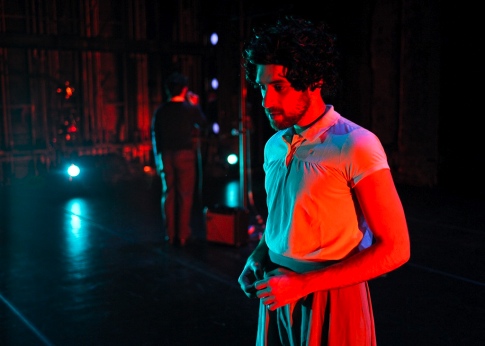
photo: Ian Douglas
